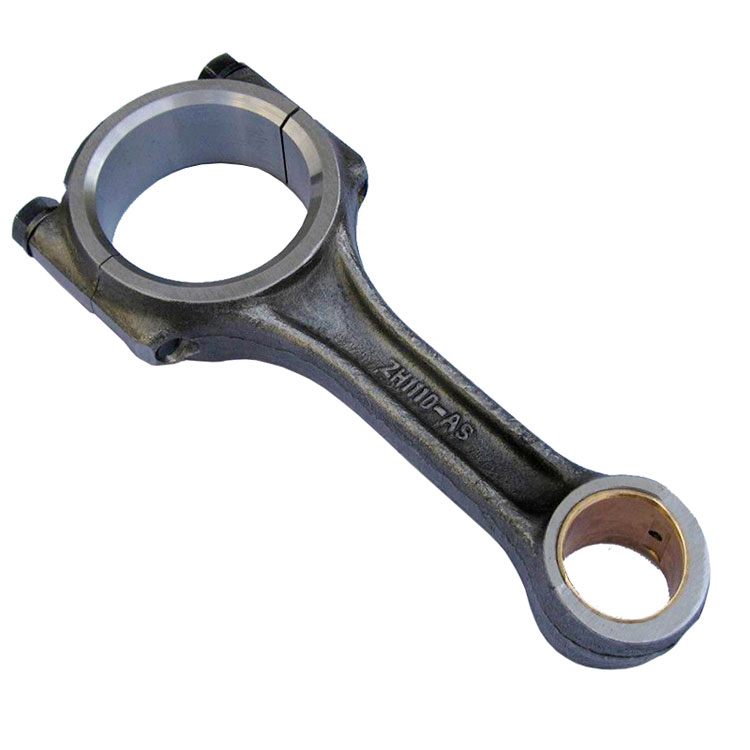
Steel Forging Parts
Material: Alloy Steel Process: Closed-Die Hot Forging Weight: 1.80 kg Application: Connecting Rod
Steel Forging Parts with OEM customized design or based on your drawings or samples. RMC could provide flexible quantities and services.
OEM Custom Steel Forging Parts by customized design.
Forging is a metal working process by hammering or pressing hot metal into the metal dies. It is one of the oldest metal working arts with its origin about thousands of years back.
Precision forging produce the final metal parts in a close to final shape or close tolerance forging way. When you need a product with near net shape or net shape, precision forging is the right choice to source, such forging process will refine the product to little or no machining. Comparing to the other metal forming processes, the precision forgings have advantages of higher mechanical properties, slight draft angles, close tolerances, small radii, and sound surface finish.
Forgings are often classified according to the temperature at which it is performed: cold forging, warm forging, and hot forging. For the latter two, the metal is heated, usually in a electric induction furnace. Forged parts can range in weight from less than a kilogram to hundreds of metric tons.
Precision Forging is a forging process in which dies move towards each other and covers the work-piece in whole or in part. The heated raw material, which is approximately the shape or size of the final forged part, is placed in the bottom die. The shape of the forging is incorporated in the top or bottom die as a negative image. Coming from above, the impact of the top die on the raw material forms it into the required forged form.
▶ Precision Forging Materials:
• Carbon Steel: Low Carbon Steel, Medium Carbon Steel and High Carbon Steel from AISI 1020 to AISI 1060.
• Steel Alloys: 20CrMnTi, 20SiMn, 30SiMn, 30CrMo, 35CrMo, 35SiMn, 35CrMnSi, 40Mn, 40Cr, 42Cr, 42CrMo...etc on request.
• Stainless Steel: AISI 304, AISI 304L, AISI 316, AISI 316L and other stainless steel grade.
• Aluminium Alloys.
• Brass & Copper.
• Other Materials and Standards on request
▶ Precision Forging Capacities:
• Max Size: 1,000 mm × 800 mm × 500 mm
• Weight Range: 0.5 kg - 100 kg
• Annual Capacity: 2,000 tons
• Tolerances: On Request.
▶ Inspecting Precision Forging Components:
• Spectrographic and manual quantitative analysis
• Metallographic analysis
• Brinell, Rockwell and Vickers hardness inspection
• Mechanical property analysis
• Low and normal temperature impact testing
• Cleanliness inspection
• UT, MT and RT inspection
▶ Post-Forging Process
• Deburring & Cleaning
• Shot Blasting / Sand Peening
• Heat Treatment: Normalization, Quench, Tempering, Carburization, Nitriding
• Surface Treatment: Passivation, Andonizing, Electroplating, Hot Zinc Plating, Zinc Plating, Nickel Plating, Polishing, Electro-Polishing, Painting, GeoMet, Zintec.
• Machining: Turning, Milling, Lathing, Drilling, Honing, Grinding.
▶ Why You Choose RMC for Precision Forging Components?
✔ High precision and therefore a high material utilization. You will get a net or near-net-shape products after precision forging process, therefore no or very little machining process is required.
✔ Better Mechanical Properties performance. After the metal is forged, the metal flow line is even distributed along the contour shape, dense and continuous. For precision forgings, there is no leakage of metal fibre that caused by removing flash, which is very useful for improving stress corrosion resistance and fatigue resistance, hardness, yield strength and tensile strength of the the forging parts.
✔ Available Complex Structure Forgings. The final forgings with complex structure and shape is totally available by precision forging process. When a metal parts is difficult to get by castings of other metal forming process, precision forging process is the right choice.
▶ General Commerial Terms
• Main workflow: Inquiry & Quotation → Confirming Details / Cost Reduction Proposals → Tooling Development → Trial Casting → Samples Approval → Trial Order → Mass Production → Continuous Order Proceeding
• Leadtime: Estimatedly 15-25 days for tooling development and estimatedly 20 days for mass production.
• Payment Terms: To be negotiated.
• Payment methods: T/T, L/C, West Union, Paypal.
 русский
русский



